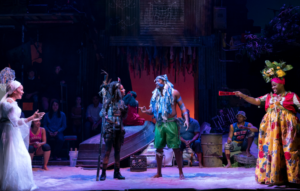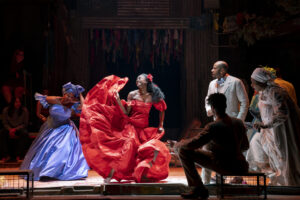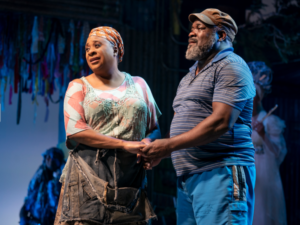Revisiting “Once on this Island” Through Modern Lenses
Written by Cynthia Isabel Zelaya Ordonez on February 21, 2020
Life. Pain. Love. Grief. Hope. It’s why we tell the story.
Once on this Island is a Tony award-winning musical that doesn’t leave room to doubt it’s worthiness in the title. In a day and age where race relations and inequality are more prevalent than ever, it’s important to revisit Lynn Ahrens 1990s masterpiece. With music created by long-time collaborator Stephen Flaherty, the song and storytelling run seamlessly together. Although neither of the pair is Hatian or French, research was clearly done in making sure that the music and dialogue did the French Antilles justice.

Essentially, the story plays out as if Romeo and Juliet and The Little Mermaid had a child together. Our story begins on a Caribbean island during a storm. The time is undisclosed but, based on the clothing, would appear to be close to the present day. A child cowers from the storm, and the villagers opt to tell her the story of a small girl who appeared on the island during a storm quite similar.
Assuming she must have been spared by the Gods for some greater purpose, islanders Tonton Julian and Mama Euralie take her in, raising and caring for her as their own, naming her Ti Moune. The little girl grows into a young lady. Restless of the unchanging island life and tempted by the light-skinned strangers driving near her village, she asks the Gods that spared her years ago for a favor. She asks to be free like a bird, to leave and see things no one before ever had, and to know her purpose.
Initially, the Gods laugh. But Erzulie, the goddess of love, pauses suddenly. Why not give her what she wants? After all, love is the strongest force of all. So why shouldn’t it rise above any other obstacle? Papa Ge, the demon of death, begs to differ, arguing death is stronger. The two Gods agree to test the young girl, making her final choice the testament to whether love is truly stronger than death. Agwe, God of water, provides a circumstance for Ti Moune to meet her love, causing a storm to derail a car near her village.
The driver is Daniel Beauxhomme, the son of wealthy French descendants. He is injured badly, and the villagers are unwilling to take action nor send word to his family for fear of being blamed for the accident. Damned if they do, damned if they don’t. But Ti Moune, for whatever reason, insists she will save his life. So She nurses Daniel while Tonton Julian goes to the white side of the island in search of help. Regardless of her relentless dedication, there comes a point where she can do no more, and Papa Ge comes for his soul. She is no match against the Demon of Death, but Papa Ge offers her a way out; exchange her life for his. And she agrees.
Soon after, Tonton Julian returns with some of Daniel’s own people, and they take him home. Heartbroken, Ti Moune sets out on a journey to be reunited with her love, leaving her tearful parents and all her life behind as she ventures into the unknown.
The star-crossed lovers continue to face a series of obstacles, but remain united in the face of adversary until, well,,, I didn’t compare this story to a Shakespearean tragedy and a horrific German fairy tale without cause.

Michael Arden shines as a director with Once on this Island. There is a growing (with valid reason) discussion across the arts about the telling of minority stories, and who has the right to tell them. Although the original creators and the current director are white, the production has been approached with utter respect and reverence. The research far exceeded a couple of google searches and interviews with Americanized descendents. Instead, Arden and the pre-production team travelled to Haiti in 2015, intent on absorbing the people, their culture, and the land they call home.
It is clear that a dialect coach was brought in at some point, as the actors speak well and colloquially, as if they’ve been born and raised on the same caribbean island. Also, a round of applause to Camille A. Brown for her outstanding choreography. Although it was stalked and layered and far from the show-tune perfection we’re all bored of seeing, it was clear every move had been meticulously planned. Even when the dancers are all doing something distinct, the movements are so quick and deliberate that a misstep would cause disaster. It’s too tight to not be coordinated. In the “Ti Moune’s Dance” especially, the research and care that must have gone into the production shines brighter than anywhere else. You are surprised to see a skilled execution of traditional dance, and not just a few steps either. Drums come in, and the dances get more elaborate, other cast members joining in as the song progresses.
More praise must be extended to the casting. It is a full cast of minorities, particularly those that clearly look like they belong on the island. Even parts like those of the grande hommes where more white, white passing, or racially ambiguous actors could have been cast are taken by people of color.
A shining gem among said cast is Tamyra Gray in the role of Papa Ge. The Demon of Death is described to be menacing and seductive, and Gray embodies it in every move of her body. The choice to cast a woman in the role only helps bring the vision to life. Every movement and vocal inflection is carefully delivered. From the way she slouched and stalked like a vulture from the roof in some scenes, overlooking Ti Moune with disdain, to the way she commands a room during “Forever Yours,” grabbing the lovers by their soul and moving them like marionettes, she demonstrates a mastery of the role.
Kyle Ramar Freeman also shines as Asaka, Goddess of Earth. This is also the first time a man is playing the role, but you wouldn’t know it unless you read the playbill. Out of everyone, he exudes warmth, nurture, and life the way only mother earth could. A provider and protector, Freeman succeeds in evoking thoughts of their own mothers in every audience member.
As an ensemble, the cast functions like a well-oiled machine while still managing to make the performance appear organic. There is not a single person that lags behind in terms of talent or preperation. If there were, they would’ve been easy to point out in a cast as sharp as this.

Once on This Island
Now we will celebrate the unsung Gods of the production, Tech. The set is elaborate and beautiful. Simple yet versatile. All was open for the audience to see as they were seating themselves, and actors were already on stage, picking up garbage from the sands and tending to clothes on a line. At first, I thought such an elaborate and heavy stage was a mistake. I wondered how they expected to transition quickly to other locations. But the lighting team came through with unexpected strength and tenacity.
The space between buildings that offered a glimpse into the world beyond the village was utilized in ways one wouldn’t initially expect. Through the use of clever projections and gel changes, we watched the sun, moon and stars dictate the time. Headlights, storms, and the supernatural were also portrayed with clever teamwork between lighting and sound.
There were a lot of great technical accomplishments within the play; Papa Ge’s spells, the great storm, and the car accident. Oh the car accident! In a stroke of both financial and creative genius to use parts off a scrapped car in the scene. Dancers hold doors and a windshield around Daniel. When he steers, they lean. They move as a unit in a way so sick, I was drawn to the edge of my seat to take in as much detail as possible.
Another highlight of the show was “The Sad Tale of the Beauxhommes.” Stong lights, pointed pantomime, and vivid storytelling are all used to tell the story of the Beauxhommes using shadows on a large sheet. Anyone that has even made a simple shadow puppet knows the images you make must be altered beyond what you’d expect in order for them to project what you desire. Knowing this, one can’t imagine how long it must have taken for someone to choreograph the song, then watch from the stage to guide and direct each movement from the audience until it looked believable.
What a beautiful story to tell. What a dangerous one to underanalyze. Ariel gives her voice, Juliet her life. Ti Moune follows suit. It’s a beautiful fairytale until you remove the tinted glasses. If anything, it’s more of a Greek tragedy than a story of love. The Gods are capricious and uncaring, or at least far from the benevolent beings they feel they are. Humans are but pawns and toys in the eyes of the Gods (hello Mount Olympus, I’m looking at you). A poor peasant girl is set to self-destruct just to prove a point. The years she has lived are but a spec in the lives of the immortals that use her to settle a dispute. What do they care? True love? Oh certainly. The villagers are correct in assuming Ti Moune is possessed when she falls in love with a man she has never even spoken to. Then she abandons her adoptive parents to seek this stranger. The people who took her in out of the goodness of their hearts, those who gave her more than they had. All because she loves him, the stranger, more than who fed and clothed her. She is bewitched, losing all sense of consideration or duty. In “Ti Moune,” she implores Mama Euralie to let her seek Daniel with “I am not a child any longer,” immediately giving me flashback of Ariel screaming at her poor merfather “I’m sixteen years old! I’m not a child!” Oh boy.
Although possessed by the Gods and carefully guided so she may fulfill her purpose, Ti Moune lacks wisdom beyond what can be gained through her simple island life. Daniel is a traitor and a liar. To omit the truth is to lie, plain and simple. But men have affairs. It’s how things are done. This is clear both in words and action. Look at his betrothed, Andrea, for all the proof you need. Knowing he has been carrying on with Ti Moune, quite publicly, she is passive. She is being cheated on in a family hotel where all the staff, family, and passersby can see. Andrea’s name, respect, and honor are trampled on. And instead of reacting with brimstone, rage, and righteous flames, she asks Ti Moune to dance at her wedding. Especially when someone did not know the other party was in a relationship, your anger should never be directed at anyone but the cheater. But even then, she shows no anger towards Daniel. Her compliments to Ti Moune’s beauty aren’t delivered snidely; they are genuine. For a microsecond, I thought Brianna Brookes had made a rookie mistake in delivery. Then I realized she was a genius. With just that tone of her delivery, she told of generations of women trained to be passive and submissive, to accept that boys will be boys, to know their place. She was raised numb.
Women are self sacrificial, both in life and literature. Even when she is the protagonist, she must die to protect, teach, or inspire her man. Our consolation is that the Gods favor her, and she is allowed to live forever in nature. She isn’t turned into a quail (Leto, a laurel tree (Daphne), a bear constellation (Callisto), or seafoam (the little mermaid). No. Instead, she becomes…
A tree.
Spit on me again, why don’t you? Would you like some lemon to rub in my wound? Here, let me cut it for you, since us ladies are only here to serve. She lives on forever as an unmoving tree outside the Hotel Beauxhommes, watching over Daniel and his children, a man who never even pretended to apologize, watching life go on around her while she is nothing but an object to the rich. Hmm, she didn’t need to go and become a tree if she wanted to be seen as that. And her poor parents, forever wondering what happened to their dear Ti Moune as their bodies age, making supporting themselves increasingly difficult as the years go by.

Once on this Island is beautiful, the ending heartbreaking, no matter how deeply you were reading into the story. Much of the audience was in tears as they gave a standing ovation.
A modern classic, Once on this Island is a show that deserves MUCH more attention than it gets. Do not mistake my criticism for dislike. On the contrary; one must be harshest on those you believe in the most. No matter who you are or how you feel about musical theater, make an effort to see Once on this Island at the Hobby Center now through March 1st.





